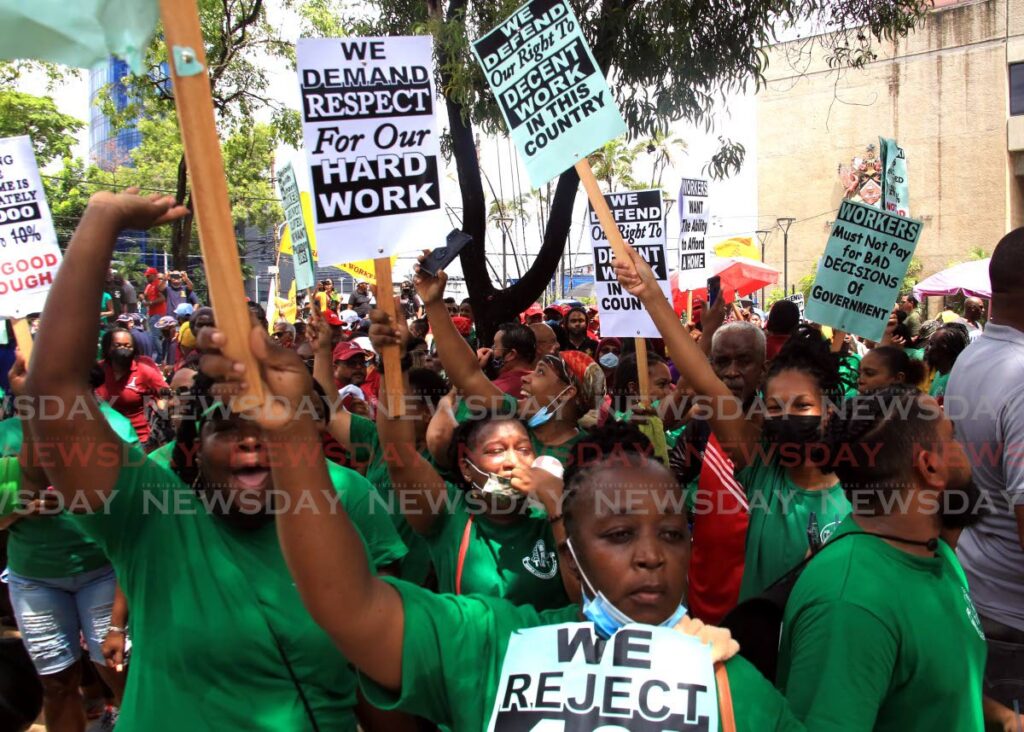
They brought up the subject. I didn't.
But the recent stand-off between the Honourable Prime Minister and the honourable leader of SWWTU (and so much else) Michael Annisette, about who treats women worse in their professional life, has forced me to revisit the ever-present subject of gender disparity at work and in political and social interactions generally.
And when I read Reggie Dumas's thesis on emancipation and reparations this week, which was so rational that I could not help wishing we could clone him and put a Reggie in every government board and institution, I could not stop conjoining the two.
The first two gentlemen aforementioned, both exemplars of patriarchal control and dominance in their various organisations, do not admit a lot of variance or emancipation by their followers from their views and direction.
They stay in their positions because their followers perceive them as strong leaders and vote them into office. There are consequences to opposing strong leaders.
Unlike most business managers, who are appointed or promoted on the strength of their qualifications, performance and experience, political and trade union leaders have to be voted in, and, as in all voting exercises, there is a strong flavour of showbiz involved.
Hence the music trucks and sectional different coloured T-shirts and the “jumping to the rhythm” of the marchers in last Friday's carefully engineered protest march. It was well done.
When it looked like only a few would march in protest against the four per cent increase for public-sector employees who were kept on with full pay when the rest of the country got by on "no pay, no work," they brought in protests against food prices, fuel costs, retrenchment in the energy industry and all the rest.
There is always something legitimately worthy of protesting over, especially poverty and oppression of other people.
There was no section protesting against the unjust war in the Ukraine, however – an opportunity missed, since the consequences of that war are beginning to show themselves in rising supply-chain limitations and costs affecting the procurement availability of some essential medical supplies…
The Scottish poet Robert Burns, in a poem addressed to a flea he had noticed on the collar of a lady sitting in front of him in church, commented: "O wad some Power the giftie gie us/To see oursels as ithers see us!"
Seeing ourselves as others see us, however, may be as difficult as scratching the middle of your back with your left elbow.
Everyone brings to bear upon matters in conflict his or her own culture, background, knowledge and expectations.
In management exercises on diversity and the potential of different people for promotion to positions of leadership, professionals were often asked to first define typical characteristics of women and then of men.
Later in the day they were asked to list 20 qualities they thought typical of people suitable for positions of leadership. The latter were: strength, stamina, leadership control, projection of authority, the ability to plan, motivate, handle conflict and so on.
They were, as you would have already noticed, 90 per cent similar to typical perceptions of "male" characteristics.
That was ten years ago. Done today, when the number of women in leadership roles grows by the year, the perceptions have changed, and Mia Mottley has become one of the international models of the perception of good leadership, adding to the list of leadership qualities.
A more recent group added integrity, communication skills, connection with the people on the street (a replacement for the term “grassroots,” which is now regarded as condescending) and the ability to network with people of other countries and cultures, a genuine acceptance of diversity.
Evidently this must include people of other genders. I doubt there are statistics on the overall gender numbers of union members, or members of political parties, but from outside it appears that most union leaders are male and over 50 per cent of their members are female.
Is this also true of political offices? I do not know.
How people of a different gender or gender persuasion are treated in a patriarchal culture such as ours, particularly in relation to the social concept of emancipation, is important as we go forward into independence.
Reggie Dumas's comments about the effects of the power controls of religion, as well as politics and economics, in the debate on reparations for slavery lead, through an epistemological inevitability, to a necessary examination of the treatment of gender, beginning with historical truth of how women have been and are still treated in employment, politics, religion, law and the press.
What is not often acknowledged is that wherever there is a shift in power, even the smallest, most seemingly insignificant shift, there is an equal and opposite pushback.
Emancipation does not come easily.
Women's perception of how they are treated in relationships, including those in political and trade union organisations, is seldom even understood, much less genuinely taken into consideration in debates such as the current one by the Prime Minister and the head of one of our leading trade-union groupings.


